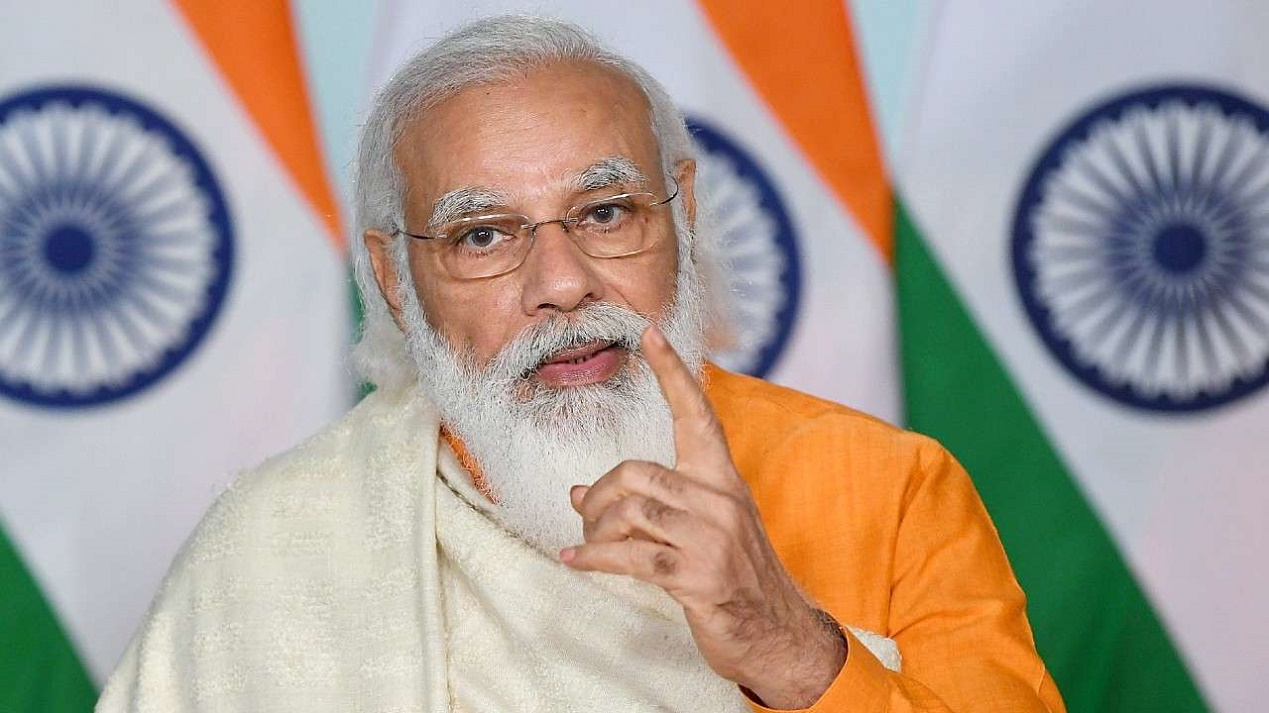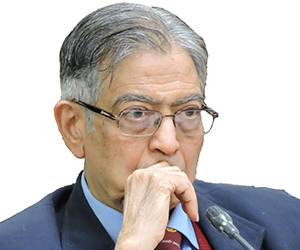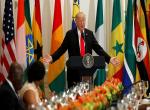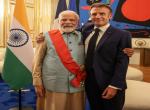As the nation reels under the impact of the monstrous second wave of the Covid-19 pandemic Prime Minister Modi has been the focus of much criticism, some justified and some unjustified, for the failure to avert it and to mitigate its adverse impact. This is understandable, to an extent, since as the tallest leader in the land he is the lightening rod for such criticism with all other stake holders in the country flying under the radar when it comes to accountability in this regard.
As India is in the throes of the Covid-19 crisis and as the Modi Government is on the verge of completing the first half of its second term in office an objective evaluation of its overall performance would be appropriate. This is no easy task as there is a sharp polarization between those unwilling to see anything good in any action taken by the Modi Government and those unwilling to concede that there are areas in which it has come up short.
Before going into the nitty-gritty of an evaluation of the Modi Government’s overall performance most objective observers will acknowledge that it has left an indelible imprint on India. Over the last seven years the nation has become more self assured and aspirational, it has found a niche for itself in the international comity of nations, it is not afraid to address issues on the basis of bold new thinking rather than on tired precedents, and above all it has become more inclusive by a conscious outreach to women and youth. Today’s India is thus quite different from that of 2014. This is primarily due to the unparalleled energy infused into the system by Modi which cannot be denied by even his staunchest critics.
The reforms initiated by Modi Government as detailed below under the rubrics of socio economic policies, security related measures and foreign policy related steps are mind boggling in terms of their range and scope as well as their boldness.
Socio-Economic Policies
- Goods and Services Tax (GST): The GST largely unifies the indirect tax regime in India. Subsuming as many as 17 indirect taxes it has impacted positively on the national economy. This reform had been in the pipeline since the turn of the century but no earlier Government had the courage to undertake it due to its complexities. The Modi Government alone had the audacity to bite the bullet and introduce the GST.
- Insolvency and Bankruptcy Code: Failed businesses and the resulting Non-Performing Assets (NPA’s) in banks had long adversely impacted the economy. Accordingly, the Modi Government enacted the Insolvency and Bankruptcy Code (IBC) law in 2016 which is perceived to be a silver bullet to tackle India's chronic problem of non-performing assets. Banks have begun to recover debts that were earlier thought to be irretrievable.
- Ayushman Bharat: Launched in September 2018, covering about 500 million Indians, this health insurance scheme provides a cover of Rs 500000 annually for cashless medical treatment in public or private empanelled hospitals anywhere in India for 3 days of pre hospitalisation and 15 days post hospitalization including diagnostic care and expenses on medicines. The scheme has already benefitted lakhs and offers much needed benefits to India’s poor.
- Pradhan Mantri Jan Dhan Yojana: This financial inclusion programme has put an end to the enormous difficulties faced by the poorer sections of society to open a bank account. Under it all Indians enjoy affordable access to financial services such as bank accounts, remittances, credit, insurance and pensions. Launched on 28 August 2014 as many as 15 million accounts were opened on the very first day. By 27 June 2018, over 318 million bank accounts were opened and over ₹792 billion (US$12 billion) were deposited under the scheme.
- Sanitation: Modi is the only Indian Prime Minister to have focussed upon an open defecation free India and to have repeatedly voiced its importance. Towards this end he launched the Swacch Bharat Mission in his very first year in office. Under it over 92 million toilets have been constructed in the country covering nearly 500 million households in one of the world’s largest operations of its kind. As a result of this endeavour the country is poised to becoming open defecation free.
- Digital India Programme: Initiated in 2015 and informed by the vision of developing digital infrastructure as a core utility for citizens, governance, and services on demand as well as for the digital empowerment of citizens it has been a huge success. The programme has witnessed a consistent upward growth trajectory and been a huge success. Its achievements cover a multiplicity of sectors and include development of broadband highways, universal access to mobile connectivity, public internet access programmes, e-governance, direct transfer of subsidies to name a few. Many major schemes and projects such as Aadhaar, Smart Cities Mission, BHIM UPI, RuPay, GSTIn, GeM (Government e-Marketplace), DigiLocker come under the aegis of the Digital India programme.
- Ujjwala Yojana: Under this scheme women in the villages are entitled to one free LPG cylinder per household. The scheme has both health and economic benefits. It has enormously benefitted the recipients and over 70% of the growth in LPG connections may be attributed to this scheme.
- Massive Cut in Corporate Taxation: In order to give a fillip to Indian Industry the Modi Government in perhaps one of its boldest moves reduced the base corporate tax rate to 22% from 30% and to 15% from 25% for new manufacturing companies in 2019.
- Liberalisation of Agriculture: In September 2020 the Modi Government took the courageous step on enacting long called for laws deregulating trade in agricultural produce and facilitating private investment. When these come into force they will make Indian agriculture far more productive. It is a pity that some middlemen supported by an unprincipled group of politicians are opposing these far reaching reforms but it is hoped that they will soon see reason and allow their implementation.
- Outreach to Women and Youth: The Modi Government has been infinitely more inclusive than any other Indian government in its consistent outreach to hitherto neglected sections of society like women and youth. Women have been sought to be empowered through the Ujjwala Yojana and Jan Dhan Yojana as mentioned above as well as by measures like the abolition of triple talaq and the ‘beti padao beti bachao’ programme. The latter celebrates the girl child. Its focus is on preventing gender biased sex selective elimination, and ensuring the survival and protection of the girl child as well as her education. As with women so too with youth the Prime Minister has been deeply concerned about their welfare. Apart from many youth oriented programmes Modi has even taken time out to interact with them on their examination related anxieties and made invaluable suggestions to mitigate their fears.
Security Related Measures
The Modi Government has been more sensitive than all previous Governments to the importance of ensuring that the needs of the Armed Forces are met with particularly in regard to service conditions, equipment, and management structures. Thus in 2015 it agreed to institutionalizing the One Rank One Pension system over which its predecessors had dithered for 45 years. It also brought into being the institution of the Chief of Defence Staff which had been recommended by the Group of Ministers on security reform way back in 2001 but which had not found favour with successive governments. Similarly, imports of critical defence platforms which had been languishing under the Congress government like that of the state of the art Rafael fighter aircraft were revived so that dangerous voids in our defence inventories were filled up. Additionally, the Modi Government recognizing the importance of self reliance in defence equipment has been extremely proactive in incentivizing the private sector in manufacture of defence equipment, has not hesitated in a departure from the past in encouraging the export of defence equipment, and has encouraged the Armed Forces to place large orders on local suppliers even for sophisticated defence items like the Tejas fighter aircraft.
Equally importantly the Modi Government has shed the pusillanimity of earlier governments in its dealings with Pakistan and China. It has not hesitated to punish Pakistan for its export of terror to Indian by resorting to exercises like the surgical strikes and the Balakot attack. On China it has not only stood firm in repelling its intrusions into Indian territory but has also taken punitive steps like minimizing Chinese imports, banning many Chinese apps, and not allowing its companies from participating in our 5G trials. It has also not allowed China a veto on our closer linkages with USA or on the steady evolution of Quad.
In a remarkably bold move, not conceived by any earlier regime, it mainstreamed Jammu and Kashmir into Indian polity by amending Article 370 which had bred separatism and denied the locals of the benefits of the reform process in the rest of the country. This one step will go a long way in integrating Jammu and Kashmir into India and substantially stamping out terrorism in the area.
Foreign Policy
India could have no better brand Ambassador than Prime Minister Modi who in his first term in office visited nearly 60 countries---double the number visited by his predecessor. There can be no denying that with his sharp intellect, brilliant articulation, and unmatched capacity to strike a rapport with his counterparts he has greatly boosted India’s global stature. While the Indian diaspora has been able to bask in this amplified stature, India itself has enjoyed huge tangible gains inter alia in terms of the close to $200 billion foreign direct investment inflows which are double the amount of inflows in the preceding five years.
In terms of multilateral diplomacy India’s star is riding high. Apart from being represented in several regional and international groupings it currently is also a non permanent member of the UN Security Council, Chairman of the WHO executive board, a member of SCO as well as of BRICS, and a part of the recently energized QUAD. The latter is poised to adopt a more activist stance and has taken shape in response to the China challenge.
India, under Modi, has taken its ties with the USA to an all time high notwithstanding the change of leadership in the latter. The two countries today enjoy a rich and multifaceted relationship and are partners in several areas ranging from trade to health and science and technology to climate change. A close relationship has also evolved on sensitive defence related issues. These links with the USA have not lead to the dilution of ties with Russia which continues to remain a reliable partner in many areas particularly for defence related supplies. Similarly, while maintaining close linkages with ASEAN and with Israel a spectacular success of the Modi Government has been the fostering of very close ties with the Gulf countries. This has been reflected in the Indian External Affairs Minister been invited as a guest of honour to the OIC Foreign Ministers Meeting in Abu Dhabi in 2019, Saudi Aramco deciding to make heavy investments in an Indian oil refinery and the UAE helping top up our strategic oil reserves. Both these countries have also adopted very helpful positions on India-Pakistan differences. Much as is the case in the evolution of closer ties with the Gulf countries India’s links with countries like Japan, Australia, Vietnam, the Philippines have also deepened in recent years perhaps in response to the China threat.
Modi’s neighbourhood first policy has been a partial success. While excellent ties have been developed with some countries like Afghanistan, Bangladesh, Bhutan and Maldives, and some lost ground recovered in ties with Sri Lanka and Nepal, the relationship with Pakistan and China has soured over the years. However, no blame can be attached to the Modi Government as it spared no effort to improve ties with them. In respect of Pakistan Modi took the unprecedented step of inviting the Pakistan Prime Minister along with other South Asian neighbours for his swearing in ceremony in 2014 and followed it up with a surprise visit to Pakistan. But all these moves floundered in the face of Pakistan’s relentless export of terrorism to India clearly demonstrating that strained ties betwixt the two are largely the result of Pakistan’s anti India DNA. Similarly, with China Modi went out of its way to befriend it as reflected in his invite to Xi Jinping in 2014 and their subsequent one on one meetings in Wuhan and Mahabalipuram. These too did not yield the desired result as a hegemonic China sees in India a threat to its quest for regional dominance. However, not withstanding these setbacks India, under Modi, is perceived as a net security provider. Not only has it always been the first responder to humanitarian crises in the neighbourhood but has during the Covid-19 pandemic provided assistance to over 150 countries by way of medicines, equipment and vaccines.
It is needless to mention that the aforesaid stellar contributions of the Modi Government have gone unappreciated by its inveterate critics. The latter, however, have three major charges against it notably that under Modi democracy in India has taken a major hit, that Muslims are discriminated against, and that it has totally mismanaged the Covid-19 pandemic.
The charge that democracy in India has been undermined under the Modi Government is ridiculous. This is reflected in the fact that no Indian Prime Minister has been as vilified and criticized by the Opposition and the media as has Modi. Furthermore, regular elections continue to be held in various parts of the country under the aegis of an impartial Election Commission and while a number have been won by the BJP many have also been won by a variety of Opposition parties which clearly would not have been possible in the absence of a fully functional democracy. Moreover, India’s free press and independent Judiciary are living testimony to the fact that the Government remains committed to Indian democracy and that it is not under threat. In this context, if the Government is at all to be faulted it is for its failure to come down heavily against the innumerable unlawful agitations which, from time to time, have afflicted the country often for weeks and months on end like the Shaheen Bagh agitation and that of the ‘arthiyas’ against the farm laws, which have ended up depriving the common law abiding citizenry of its freedom of movement. The Modi government could also be faulted for not taking over some of our state government either for sheer incompetence or for encouraging violence and anti national activity.
The issue of Muslims being discriminated against is something which has been blown out of proportion. It stems from a series of actions taken by the Government such as the construction of the Ram Mandir, the Citizenship Amendment Act, measures against cow slaughter, etc. None of these moves were per se directed against the Muslim community but were in deference to the sentiments and interests of the majority community. Regrettably, some in India see in this a violation of secular principles as for decades the nation had become accustomed to pandering to Muslim interests and totally ignoring majoritarian sentiments. The Modi government while rectifying this imbalance treats all communities equally on the principle of ‘sabka saath sabka vikas’. Since the Muslim community no longer enjoys a privileged position in India and is being treated on par with all other communities this is perceived by some as discrimination. Such elements forget that it is only the Modi dispensation that has taken proactive and bold steps to eradicate the evil of triple talaq which had plagued Muslim women in the country for centuries.
On mishandling the Covid-19 pandemic it is wrong to single out the Modi government alone as culpable. Any objective observer would note that India as whole, with the solitary exception of its frontline health workers, performed poorly. The guilt for this failure rests on the people, the state governments, the central government, our bureaucrats and our political leaders.
The people are guilty as they totally disregarded Covid appropriate behavior despite repeated warnings thereby allowing the pandemic to spin out of control and engulf the nation with monstrous ferocity. To make matters worse some are now resorting to hoarding and black marketing of oxygen and medicines. The state governments are guilty for failing to enforce Covid appropriate behavior and ensuring that there is no hoarding and black marketing, for not reading the unmistakable signs that a second wave of the pandemic was on the cards, for not upgrading their medical infrastructure as had been planned months earlier, and for neither heeding the centre’s warnings to make up their shortcomings in this regard nor keeping it fully in the loop on the severity of the emerging crisis at the ground level.
The central government, on its part, is not blameless. It should, for instance, have been able to anticipate that a second wave of the pandemic of far greater intensity than the first wave was likely and, accordingly, taken steps both to minimize this possibility and to cater to worst case scenarios by ensuring that healthcare facilities countrywide were appropriately upgraded through draconian measures if necessary. The argument that no one could have foreseen a second wave of the pandemic of such ferocity is specious. In this context, it should have been recalled that the second wave of the Spanish flu in 1918 in USA caused four times the number of deaths that it had caused in the first wave. In India, too, the second wave of the Spanish flu pandemic was much more deadly than the first wave and it is reported that funeral pyres in Bombay burnt non-stop night and day. Moreover, only recently many western countries experienced a devastating Covid-19 second wave and some imposed lock downs. Above all, a consortium of national laboratories tasked with genome sequencing or INSACOG had forewarned the government in early March that they had high concerns about variant strains of the coronavirus that were particularly contagious and were in danger of taking over the country. Finally, the quadrupling of Covid-19 cases in India from around 9000 in mid February to around 47000 on 23 March should have alerted all those dealing with the situation of the impending crisis. In defence of the Modi government it can be said that it had since January 2021 issued repeated advisories to the state governments to beef up their medical infrastructure. Indeed, as indicated by the Information Minister, the Prime Minister had, while addressing the Chief Ministers on 17 March 2021 drawn pointed attention to the increasing positivity and case loads and stressed the importance of stopping the emerging “second peak.” In this context, he urged that “difficulties in governance at the local levels should be looked into, reviewed and resolved. Our confidence should not become over confidence and our success should not turn into negligence.” Regrettably, these warnings went unheeded. Had they been taken seriously we would have been much better placed today. But here again the centre should have acted much more effectively to ensure that its advisories were acted upon rather than have remained mere paper missives. Inaction by the states in a national disaster of this magnitude would have justified imposition of President’s rule. Of course, this would have led the inveterate critics of the Modi government to assert that this constituted a further hit on democracy!!!!
While the Modi government must be commended for encouraging and supporting indigenous vaccine development and production from last year itself, as well as for launching an immunization programme earlier this year in the face of much scepticism by an irresponsible and obstructive Opposition, here too the crafting of policy in this regard was flawed. It appears that the centre, at the very outset, envisaged a rather modest immunization programme covering around 30% of the total population over a six to nine month period. The Government would have been better advised to have been much more ambitious and planned for the immunization of the entire population in no more than a maximum of six months. This was necessary as the vaccine is the magic bullet to address a pandemic of this nature. Had this been the approach fare heavier investments would have been made by the Government than were actually made last year itself in order to drastically scale up vaccine production commensurate with our requirements. This would also have averted the repeated flip flops in our vaccine policy—both on eligibility and on price--- and the vaccine shortages we now face. In any case, it is to be hoped that the Modi Government will now at least not only drastically scale up our vaccine capabilities but also urge our vaccine manufacturers to regularly tweak our vaccines to cater to the newer strains of the Covid-19 virus. In fact, this will need to be done annually for some years to come as in the case with all flu vaccines.
The Modi Government has come in for much unwarranted criticism for its vaccine diplomacy. In this context, it may be noted that the bulk of India’s vaccine exports were of Covishield--- the Oxford University AstraZeneca vaccine--- which were produced by the Serum Institute of India and the latter was contractually obliged to effect the same as it had received external financing for production. Accordingly, our vaccine shortage is not essentially on account of vaccine export but of insufficient locally developed and controlled production. It may also be kept in mind that our lending a helping hand to other nations in a health emergency is in keeping with India’s best traditions and has been much appreciated the world over. Modi’s vaccine diplomacy was, therefore, a step in the right direction and is in large measure responsible for the unstinting foreign assistance that is now flowing into India to handle the second wave of the pandemic.
The bureaucrats and experts in the health and home ministries are also accountable for the mishandling of this crisis as they were in direct charge of this issue and failed in anticipating it and mitigating is impact. As also pointed out by the Election Commission none of the concerned State Disaster Management Authorities had warned the election commission of the dangers of conducting elections during this period. It must, however, be noted that the Election Commission was not living on another planet and should on its own have postponed these elections. Such postponement should, of course also have been advocated by all concerned governments.
Finally, all our political parties have failed the nation. Their members are guilty, on the one hand, of flouting all norms of Covid appropriate behaviour by participating in and encouraging all kinds of large rallies and gatherings often without being properly masked and, on the other hand, by engaging in a fruitless and counterproductive blame game at a time when constructive cooperation is the need of the hour. Members of some Opposition Parties indeed went so far as to try and undermine the vaccine campaign by spreading falsehoods about it and are thus responsible for much of the vaccine hesitancy which had marked the initial phase of the vaccine campaign.
In the midst of the doom and gloom that pervades the nation on account of covid-19, it is imperative that the Prime Minister addresses the people taking them into confidence on the current situation, on the remedial steps that have been invoked, and on the fact that responsible behaviour from all stake holders is essential to enable India to overcome this crisis rapidly. Such an act of leadership which was on display when Covid-19 struck last year bears repetition as it would greatly enhance morale.
Apart from coming up short in handling the Covid-19 pandemic the Modi Government has also failed to adequately address the issues of governance deficit and ineffective policing which afflict the country and erode its vitality. It has also not engaged in perception management so essential to prevent and mitigate the spate of unfounded criticism faced by the country.
The outcome of many of the Modi Government’s very laudable initiatives has been less than optimal due to a governance deficit. This has steadily increased over the years, and has adversely affected the delivery of services at all levels and in all spheres. Much of this governance deficit is due to bureaucratic apathy, lack of innovation, and absence of drive. Programmes like Swacch Bharat, Make in India, Smart Cities etc have not succeeded to the extent they should have as they are wanting in conceptual clarity about the precise objectives, the timeframe in which these are to be achieved, the required wherewithal and how it is to be obtained, and the implementing and monitoring mechanisms to ensure timely completion. Once such programmes were announced a responsive bureaucracy should have fleshed them out and crafted the methodology and processes to bring them to successful timely fruition. Regrettably, this has not happened. This governance deficit has also most dramatically manifested itself in the Covid-19 crisis confronting the nation. An effective bureaucracy would have been able to largely avert this crisis or at least substantially mitigate its impact.
Overcoming the bureaucratic apathy would require a systemic overhaul of our administrative procedures and structures which we inherited from colonial times. Simplification of rules and regulations, establishment of clear, well conceived, and comprehensive standard operating procedures on each issue, empowerment of officials and their being held accountable for specific targets would go a long way to improve the situation. For the higher civil services it is essential to demand excellence of performance and set the highest standards of accountability.
Pending such a systemic overhaul which will be time consuming a monitoring unit must be set up in the PMO to ensure that at least the projects and programmes of the highest importance are undertaken in an effective and time bound manner. Delivery of governance on basics at the local level could perhaps be monitored by the Cabinet Secretary through the Chief Secretaries. Where states are not responsive, a carrot and stick approach would have to be devised to ensure that they deliver on key governance issues.
Ineffective policing has been a fact of life in India for decades with the capabilities of the police force having over the years been severely attenuated. All manner of crime is rampant throughout the country and people have little confidence in the police which also do not inspire any fear amongst the criminal elements. Unchecked incidents of cow vigilantism, the Baba Ram Rahim episode, repeated bouts of rioting in many parts of the country have amply demonstrated the frailties of policing in India. The police which used to provide grass roots level intelligence in the past no longer do so. It is sad but true that our policemen are overworked and underpaid. They are also ill equipped and ill trained. Many are also corrupt. Political influence has further undermined their effectiveness. The solution is early implementation of the reforms recommended by any number of committees including filling the huge gaps in vacancies and in training and sensitisation.
One of the knotty issues in this regard is the fact that law and order is a state subject and implementation of some of the recommendations notably on police modernisation are likely to run into problems particularly in states controlled by Opposition parties who are unwilling to spend the required resources on it. In the past the centre used to allocate the bulk of the resources for this purpose but of late has been allocating smaller amounts as the states are now beneficiaries of a larger proportion of the national resources and as this is a state subject it is logical for the states to do the needful. The states, however, spend the minimum possible on the police and provide barely enough for salaries. One way out of this impasse is to create an escrow account for each state for police modernisation into which the centre and the state would deposit their respective predetermined shares and the state could dip into it only for police modernisation.
As regards the insulation of the police from political influence, the Supreme Court's directions of September 2006 provide a clear set of guidelines in the matter. In short, these directions envisage fixity of tenure for police officers and debar political involvement in their postings and transfers and indeed in all service matters related to them. Regrettably, these reforms were opposed by several states and remain unimplemented. Government would be well advised to push for implementation of the Supreme Court's directions in the matter and if necessary make this an election issue as political interference is the bane of good policing in the country.
Finally, it is a pity that though the Modi Government has done much good work it still gets a bad press both in India and abroad and even prima facie excellent measures like the farm laws are not only criticized but become an issue for extensive and prolonged agitation. Much of this could be avoided if the Government acts with greater transparency and through greater consultation with those primarily affected. Additionally, it should consider institutionalizing systems to address perception management both in the local and foreign media. The media has been, is, and will always be an indispensable tool for perception management and it is unfortunate that the Modi Government does not appear to have internalized this.
(The paper is the author’s individual scholastic articulation. The author certifies that the article/paper is original in content, unpublished and it has not been submitted for publication/web upload elsewhere, and that the facts and figures quoted are duly referenced, as needed, and are believed to be correct). (The paper does not necessarily represent the organisational stance... More >>
Image Source: https://cdn.dnaindia.com/sites/default/files/styles/full/public/2021/03/08/962652-946294-pm-narendra-modi.jpg











Post new comment